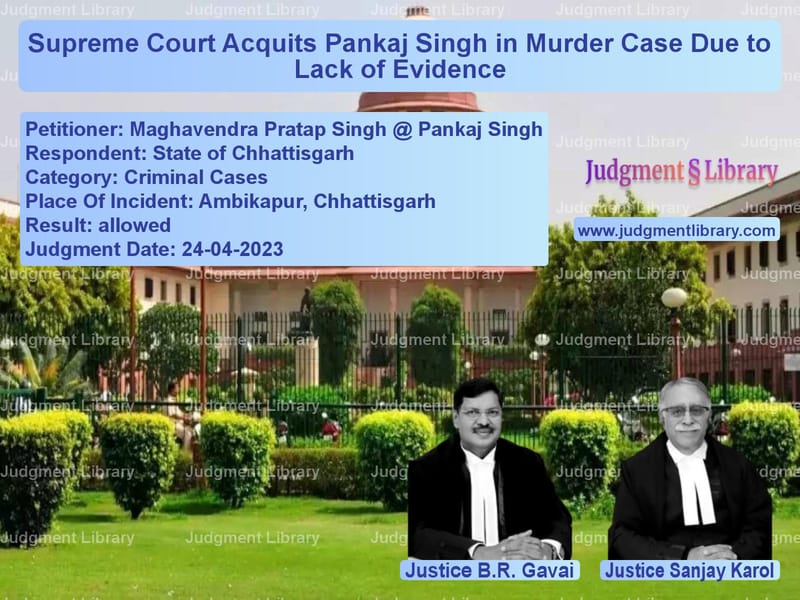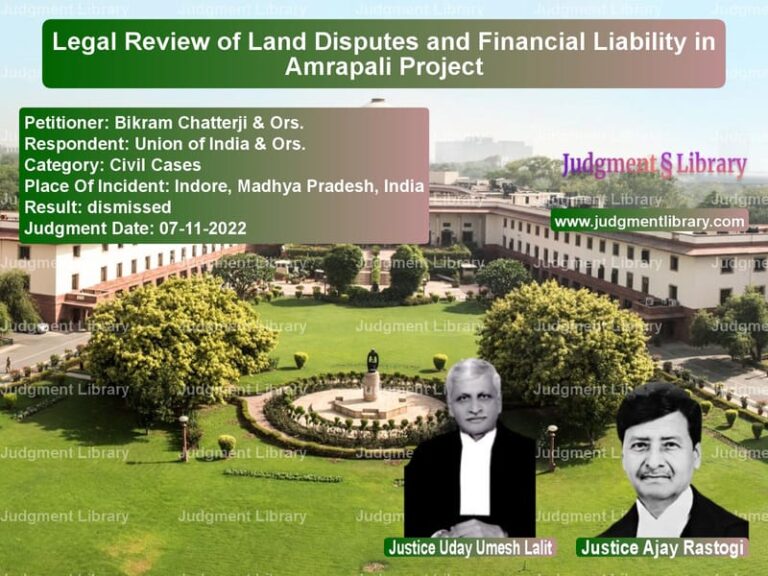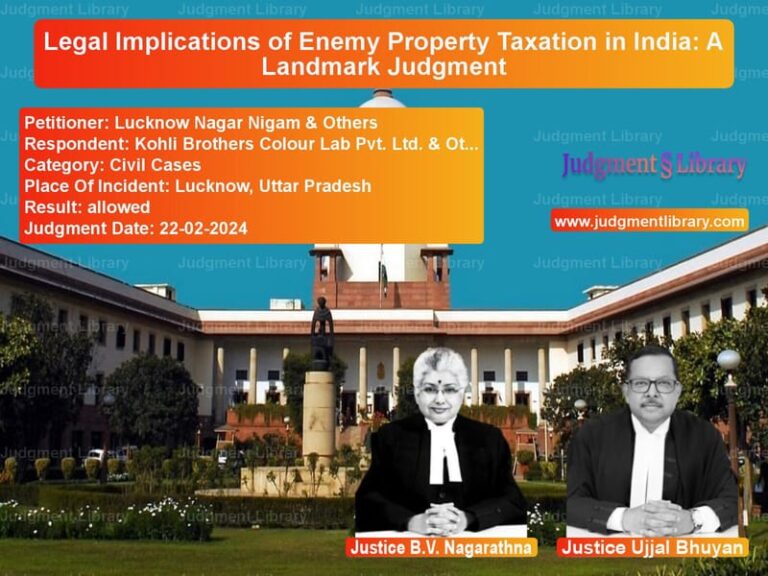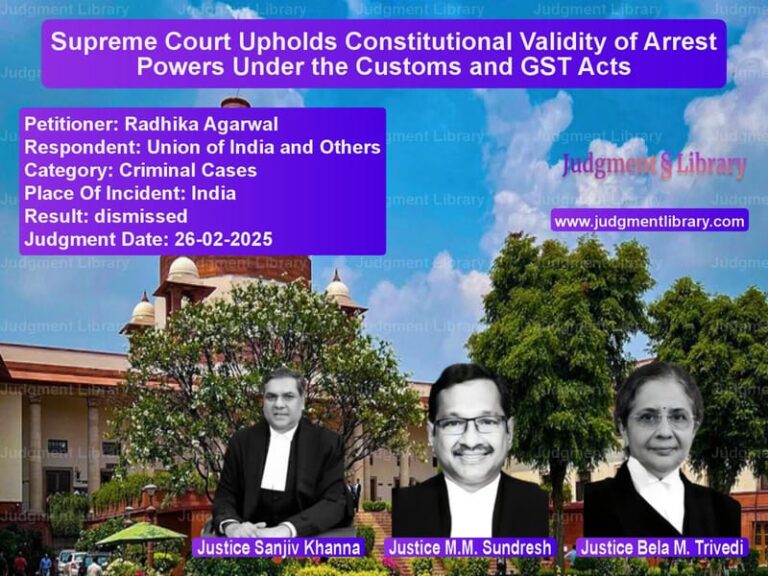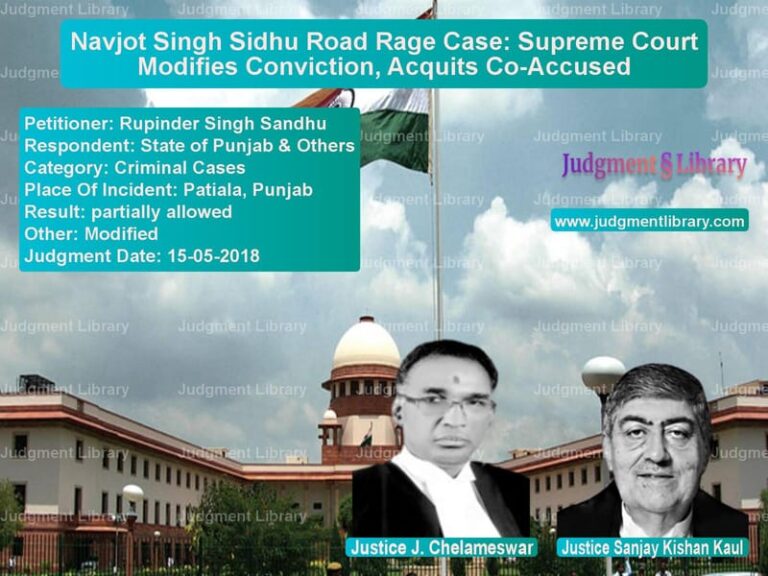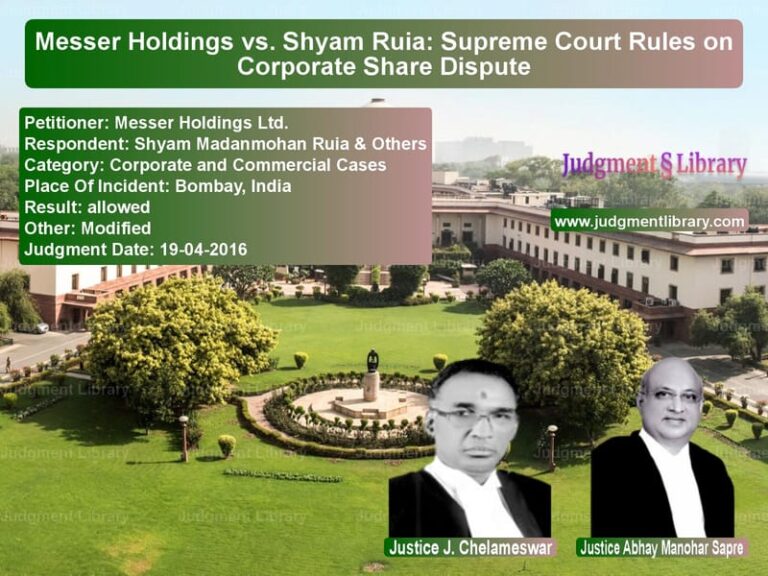Supreme Court Acquits Pankaj Singh in Murder Case Due to Lack of Evidence
The Supreme Court of India recently delivered a significant judgment in the case of Maghavendra Pratap Singh @ Pankaj Singh vs. State of Chhattisgarh. The case revolved around the murder of a businessman, Goverdhan Aggarwal, in Chhattisgarh. The appellant, Pankaj Singh, had been convicted by the trial court and the High Court for the murder, based on circumstantial evidence. However, the Supreme Court overturned the conviction, citing a lack of credible evidence and procedural lapses in the investigation.
Background of the Case
The case originated from the murder of businessman Goverdhan Aggarwal on September 26, 2009, in Ambikapur, Chhattisgarh. Aggarwal was shot dead by two motorcycle-borne assailants after he left his office around 7:00 PM. The police registered an FIR at P.S. Gandhi Nagar and launched an investigation.
According to the prosecution, a group of accused individuals, including Pankaj Singh, conspired to murder Aggarwal. The prosecution alleged that Singh played a key role in the conspiracy by providing information about the victim’s movements. The charges against him included:
- Section 302 (Murder) of the Indian Penal Code (IPC)
- Section 201 (Causing disappearance of evidence) of the IPC
- Section 25(1)(1-b)(a) of the Arms Act, 1959
Trial Court’s Findings
The trial court convicted Pankaj Singh and other co-accused based on circumstantial evidence. The court found that:
- Pankaj Singh had allegedly conveyed information about Aggarwal’s movements to the killers.
- He was found in possession of illegal firearms and cartridges.
- The crime was committed as part of a larger conspiracy.
Based on these findings, Singh was sentenced to life imprisonment under Section 302 IPC, along with concurrent sentences for other charges.
High Court’s Judgment
The case was appealed to the Chhattisgarh High Court, where most of the co-accused were acquitted due to lack of evidence. However, the High Court upheld Pankaj Singh’s conviction, stating:
- “The chain of evidence is complete, and in all human probability, the act must have been done by the accused.”
- The High Court relied on the testimonies of prosecution witnesses, including Ashish Aggarwal (PW-1), Naresh Mandal (PW-6), Avinash Tirki (PW-7), and Investigating Officer J.S. Saggu (PW-23).
- Singh was allegedly in possession of illegal arms and had concealed evidence related to the crime.
Arguments Before the Supreme Court
When the case reached the Supreme Court, Pankaj Singh challenged his conviction, arguing that:
- The entire case was based on circumstantial evidence with no direct proof linking him to the crime.
- The investigating officer failed to establish a credible link between him and the murder.
- All other co-accused had been acquitted, making it legally unsound to hold him guilty of conspiracy.
- The alleged recovery of firearms was questionable, as independent witnesses denied their involvement.
The State of Chhattisgarh, on the other hand, argued that:
- Singh played a key role in facilitating the crime by passing information about the victim’s movements.
- The presence of firearms in his possession indicated his involvement in the murder.
- The High Court correctly convicted him based on the circumstantial evidence.
Supreme Court’s Key Observations
The Supreme Court analyzed the evidence in detail and found several flaws in the prosecution’s case. The Court made the following crucial observations:
- “There is no direct evidence linking the appellant to the crime. The prosecution’s case relies entirely on circumstantial evidence, which does not meet the required legal standard.”
- “All co-accused in the case have been acquitted, which raises serious doubts about the existence of a conspiracy.”
- “The independent witnesses (PW-6 and PW-7) did not support the prosecution’s claims, and their testimonies suggest they were coerced into signing blank papers.”
- “The Investigating Officer (PW-23) failed to conduct a fair investigation, and his statements lacked credibility.”
- “The conviction was based on probabilities rather than certainties, which is impermissible in criminal jurisprudence.”
Supreme Court’s Final Judgment
Based on these findings, the Supreme Court set aside Pankaj Singh’s conviction and ordered his immediate release. The Court held:
- “Given the inconsistencies in the prosecution’s case and the lack of direct evidence, the conviction of Pankaj Singh cannot be sustained.”
- “The appellant is entitled to the benefit of doubt, and his conviction is accordingly set aside.”
- “If not already released, the accused is directed to be set at liberty forthwith.”
Implications of the Judgment
The Supreme Court’s decision has significant implications for criminal law and judicial proceedings in India:
- Importance of Direct Evidence: The ruling reinforces that convictions should not be based on mere suspicion or probabilities but must be supported by solid evidence.
- Fair Investigations: The judgment highlights the need for police officers to conduct fair and unbiased investigations. Lapses in investigation can lead to wrongful convictions.
- Protection Against Misuse of Circumstantial Evidence: The decision safeguards individuals from being convicted solely based on weak circumstantial evidence.
Conclusion
The Supreme Court’s verdict in Maghavendra Pratap Singh @ Pankaj Singh vs. State of Chhattisgarh is a landmark ruling that underscores the importance of due process in criminal cases. By setting aside a conviction that lacked substantive evidence, the Court has upheld the fundamental principle that every accused person is innocent until proven guilty beyond a reasonable doubt.
Petitioner Name: Maghavendra Pratap Singh @ Pankaj Singh.Respondent Name: State of Chhattisgarh.Judgment By: Justice B.R. Gavai, Justice Sanjay Karol.Place Of Incident: Ambikapur, Chhattisgarh.Judgment Date: 24-04-2023.
Don’t miss out on the full details! Download the complete judgment in PDF format below and gain valuable insights instantly!
Download Judgment: maghavendra-pratap-s-vs-state-of-chhattisgar-supreme-court-of-india-judgment-dated-24-04-2023.pdf
Directly Download Judgment: Directly download this Judgment
See all petitions in Murder Cases
See all petitions in Bail and Anticipatory Bail
See all petitions in Custodial Deaths and Police Misconduct
See all petitions in Judgment by B R Gavai
See all petitions in Judgment by Sanjay Karol
See all petitions in allowed
See all petitions in supreme court of India judgments April 2023
See all petitions in 2023 judgments
See all posts in Criminal Cases Category
See all allowed petitions in Criminal Cases Category
See all Dismissed petitions in Criminal Cases Category
See all partially allowed petitions in Criminal Cases Category

